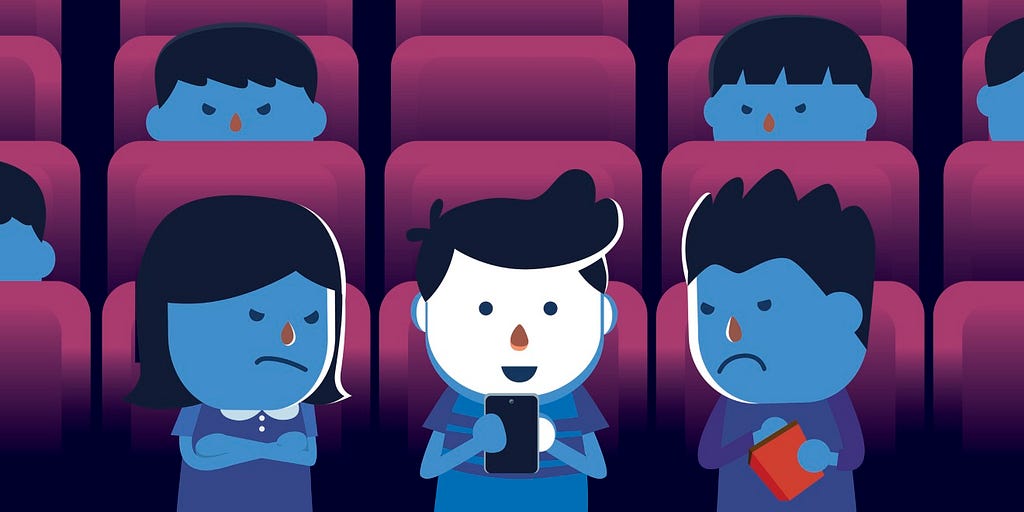
The annoying habit of pulling out our phones is wreaking havoc on our well-being. Is it time to put into quarantine our smartphones?
Here are series of commonplace scenarios we all know perfectly well: a dinner party; a casual encounter with a colleague; an unexpected date; a hiking trip to the forest with a good friend. All of these social settings have been invaded by an omnipresent guest: our cell phones.
Nosediving has become the new social norm. Wherever you look, and at all times, there’s always someone endlessly enthralled in their black-mirrored fantasies. Thriving in the online world, exercising their fingertips to the maximum. The phenomenon even has a term for it: “phubbing”, as for phone snubbing. We all have been guilty of doing it, and victims of it too.
How many times have you gone to a place to spend some quality time with an old friend, have a nice, catch-up dinner with a relative or a romantic date, just to realize that they aren’t interested in engaging with you, but with their phones?
The democratization of technology has given us unlimited access to our gadgets. It seems like we can no longer live without being immersed 24/7 in a state of permanent interaction. Social media has exacerbated this constant need by supplying boundless amounts of new content every second deliberatively making us addicts to our devices and triggering our brains for intermittent rewards. Smartphones have overtaken laptops and computers as the preferred device to access the internet and irrevocably have changed how we socialize, work and even love.
Designed to be used as a multifunctional communicative mechanism, phones and tablets have become an integral part of our daily routines. With phones, we possess a vast array of multipurpose tools available at our fingertips. The ubiquitous artifact provides us with a series of perks: enabling communication with others, no matter what their distance is, it can be used for education, entertainment, and even research purposes. But, despite the advantages, are smartphones detracting us from social interaction rather than complementing it? Has the intimate relationship we have with our phones become toxic?
Never before has humanity had so much access to information right in their pockets. Phones are so ingrained in us that is the last thing we see before we go to bed, and for some, one of the first things they see immediately after waking up — nearly 80% of users. We are obsessed with phones, on average, we check them 80 times a day; spending around 4.7 hours around them every day. It’s madness.
Paradoxically, phones have also the potential of disrupting and damaging our social interactions. For example, affecting our romantic relationships. In the provocatively titled paper, “My life has become a major distraction from my cell phone,” Meredith David and James Roberts found that cell phones undermine the satisfaction couples have in their relationships. A higher level of phubbing between partners is also correlated with a higher presence of conflict and depression. A recent study published in the Journal of Applied Social Psychology last March found that getting phubbed in a social setting has a negative impact on perceived communication quality and relationship satisfaction. According to the authors ‘phubbing’ lowers our mood and threatens four of our most fundamental human needs: belongingness, self‐esteem, meaningful existence, and control.
There is also compelling evidence that suggests that the mere fact of having a phone out on the table without even using it, highly interferes with the development of interpersonal relationships, negatively influences the quality of the conversation, affects trust, closeness, and reduces the amount of empathy between subjects.
Smartphones feed our neediness for continuous interaction and play with our fear of missing out and lack of self-control. All of these predictors — along with internet addiction — lead to phubbing behavior, ultimately putting us into a vicious circle of extreme connectivity.
Back in 2005, Japanese author I. Habuchi argued in his piece published in the book “Personal, Portable, Pedestrian” that mobile phones have the ability to diminish the quality of interpersonal engagements by putting individuals under a “tele-cocooning” umbrella. With the popularization of apps like Instagram, Snapchat, and Facebook the use of smartphones and the amount of people opting for an online life, has skyrocketed. Are we losing the art of face-to-face interaction? And, why are we normalizing and perpetuating this kind of behavior?
“We expect more from technology and less from each other.” ― Sherry Turkle
We currently live and thrive in a world full of distractions empowered by the internet. By staring at their screens people often divert their attention away from a present moment to focus on a virtual event, an online interaction, or a meaningless — almost harmful — feed-scroll. Some people argue that it’s possible to be with our phones and pay attention to others at the same time — hail multitasking! — nothing could be further from the truth, according to MIT professor Sherry Turkle author of “Alone Together”, smartphone use during face-to-face interactions makes people less involved and attentive in the conversation, thereby decreasing the quality of the conversation.
Finkel and Kruger observed back in 2012 couples having dinner together and discovered that individuals were more likely to pull out their phones if their partner had done so 10 seconds before them. They found that phone use was contagious. When we feel excluded by others phubbing us, we are more prone to take our phones out in order to restore the sense of social inclusion previously lost.
“Being enslaved to our phones has become the new normal. An inherent part of today’s human life and interaction.”
Simply put, the current attention economy incentivizes navel-gazing distraction which, in turn, hinders our relationships with others and endangers our social skills from the bottom up. When it comes to connectivity, the lines are very blurred, the irony is present too. We go to a place to interact in person, we get phubbed, in return, we turn to our phones to get instant gratification in the shape of online interaction missing the original act of intimate connection.
Social rejection enabled by phubbing raises a lot of crucial questions: Should we be permissive towards people’s toxic digital habits? As with smoking, I wonder, if is it time to address phubbing as a critical social issue. In the end, not everybody needs to smoke, but we all have the need to communicate, to talk, to be heard and acknowledged. If we don’t like to be disrespected, disregarded, and unheard, then why are we letting this digital intrusion get the best of us? Why are we putting at risk our friendships and relationships over a simple notification, a text?
“A wandering mind is an unhappy mind.” — Matthew A. Killingsworth
It’s time to diligently address these issues. It is imperative to understand and study the effects, both positive and negative, of our current modern behavior with technology in order to have a clearer image of how the future will look.
Next time you feel the temptation of hunching over a screen, consider stopping for a moment to appreciate what surrounds you. Before plunging ourselves into a virtual conversation let’s put down our phones and stop to look at the person or people that are with us in the eyes, and listen to what they have to say. As humans we are social beings, we have an innate instinct to belong, to connect, to be included. We crave interaction, it’s a universal feeling we all share.
Technology has the power of making our lives easier, but when it interferes and threatens our well-being, we should take action. The first step in order to make some change is awareness. We should practice more mindfulness in the present moment, exercise a bit of self-control, and have some cell phone hygiene before it’s too late.



No comments:
Post a Comment